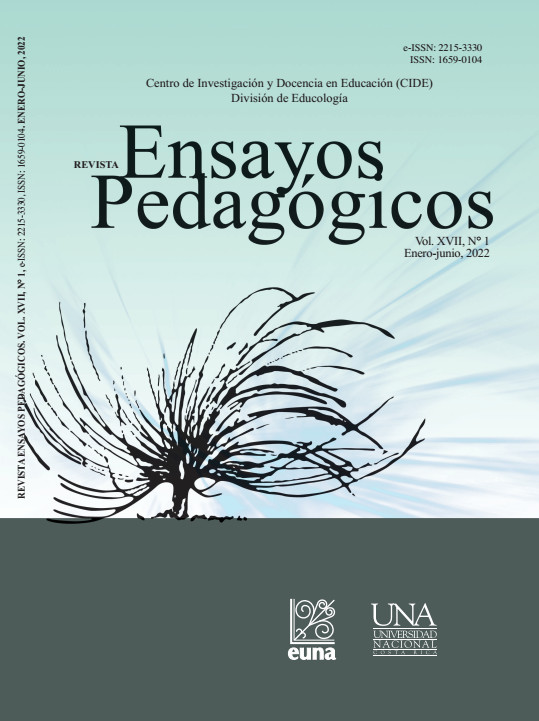Cultural Dimension in the Educational Approach of Integral Prevention "Circle of Integral Well-Being." Reflections from the Discipline of Counseling
DOI:
https://doi.org/10.15359/rep.17-1.14Keywords:
counseling, culture, education, prevention, social welfareAbstract
The changes, demands and social challenges, as well as the new scenarios in various areas of the human being lead us to reflect on and to review the models, approaches, strategies and designs in Counseling. The purpose of this research is to contribute to the scientific debate in this discipline and other areas that converge in the comprehensive care of the human being. Therefore, the intended objective is to propose the cultural dimension in the Circle of Integral Well-being (CBI in Spanish) through the argumentation of the educational approach of integral prevention. The research approach is qualitative with content-analysis design. Three steps were carried out in the methodology: first, the empirical data were collected with different techniques; subsequently, the data were organized for the understanding and construction of analysis categories and, finally, the data were analyzed with a comparative method. Among the main results, a new dimension is incorporated in the educational approach of integral prevention “circle of integral well-being” and the theoretical argumentation of the cultural dimension. In addition, the importance of rethinking and reflecting on the theoretical and methodological bases of the discipline is highlighted in the face of the new challenges that arise.
References
Álvarez, M. y Bisquerra, R. (2012). Orientación educativa. Wolters Klumer.
Asamblea Legislativa de la República de Costa Rica. (1957). Ley Fundamental de Educación. N 2160. Costa Rica. http://www.pgrweb.go.cr/scij/Busqueda/Normativa/Normas/nrm_texto_completo.aspx?param1=NRTC&nValor1=1&nValor2=31427&nValor3=33152&strTipM=TC
Besalú, X. (2002). Diversidad cultural y educación. Síntesis educación.
Bisquerra, R. (2000). Educación emocional y bienestar. Praxis.
Bisquerra, R. (2011). Modelos de Orientación e Intervención en Psicopedagogía. Wolters Klumer.
Caplan G. (1989). Recent developments in crisis intervention and the promotion of support service. The journal of primary prevention, 10(1), 3–25. https://doi.org/10.1007/BF01324646
Mata, (2015). El desarrollo teórico de la orientación. Un aporte de la Universidad de Costa Rica. EUCR.
MEP. (2019). Orientaciones técnico-administrativas para la operacionalizar el Servicio de Orientación en el ámbito regional y de centro educativo, 2019 (Oficio DVE-DOEV-74-2019). MEP. https://www.cpocr.org/wp-content/uploads/2019/02/Orientaciones%20t%C3%A9cnico%20adm%20DOEV%20%202019.pdf
MEP. (s. f.). Educación para la Salud Integral. Dirección de Recursos Tecnológicos en Educación (DDIE) MEP.
Galdona, J. (s. f.). “La transversalidad en el currículo”. La formación de las estructuras éticas de la persona. Sala de lectura, OEI. http://www.formaciondocente.com.mx/Bibliotecadigital/07_DesarrolloHumano/La%20Transversalidad%20en%20el%20Curriculo.pdf
Organización Panamericana de la Salud. (2021). Promoción de la Salud. https://www.paho.org/es/temas/promocion-salud
Pereira, M. T. (1998). Orientación Educativa. EUNED.
Presidente de la República y Ministro de la Presidencia. (2001). Plan y Estrategia Antidrogas del Gobierno de la República de Costa Rica. N 29819-MP. http://www.pgrweb.go.cr/scij/Busqueda/Normativa/Normas/nrm_texto_completo.aspx?param1=NRTC&nValor1=1&nValor2=47165&nValor3=50024&strTipM=TC
Solano, J. (2019). Pedagogía itinerario y desafíos. Letra Maya.
Villegas, M. M. (2006). Pedagogía para la comprensión. Un modelo didáctico para propiciar la inclusión social. Revista de Pedagogía, XXVII(79), 307-350. https://www.redalyc.org/articulo.oa?id=65907905
Vignolo, J., Vacarezza, M. Álvarez, C. y Sosa, A. (2011). Niveles de atención, de prevención y atención primaria de la salud. Prensa Médica Latinoamericana, XXXIII(1), 11-14. http://www.scielo.edu.uy/pdf/ami/v33n1/v33n1a03.pdf
Published
How to Cite
Issue
Section
License
Ensayos Pedagógicos is subscribed to the Attribution-NonCommertial-NoDerivatives 4.0 International Creative Commons Licence, which allows both authors and readers to freely download, store, copy, and distribute the final approved publisehd version of the manuscript (post-print) as long as this is done without commercial purposes, no derivative works are generated, and the source and author are mentioned. As well, Ensayos Pedagógicos declares that authors will remain the rightful owners of the copyrights of their work in perpetuity.







